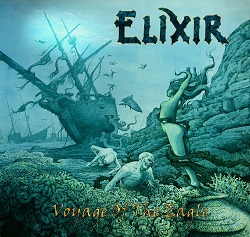 Here’s an in-depth interview with Elixir guitarist Phil Denton. All the way backin the mid-1980s when NWOBHM “ruled” they debuted with the excellent Son of Odin.
Here’s an in-depth interview with Elixir guitarist Phil Denton. All the way backin the mid-1980s when NWOBHM “ruled” they debuted with the excellent Son of Odin.
And the band are still pumping out the good stuff as evidenced by recent release Voyage of the Eagle.
Thanks to Leon, who put me in touch with Phil. And thanks to Phil for being so comprehensive and supplying the photographs which appear throught this post.
Here we go…..
Q: Is it true that Elixir got their name from a random finger prod in a dictionary by Steve Bentley
PD: Yes, so Kev (Dobbs, bass) tells me. We had toyed with a couple of names, but nothing was grabbing us. Kev and Steve were together one day, opened a dictionary, Steve closed his eyes and pointed at a random entry. His finger fell on Elixir, the guys liked the definition, and so they suggested it to Nigel and me. I didn’t want to go for a cheesy Heavy Metal name, so I liked Elixir, as I thought it was subtle. The definition seemed quite mystical; a potion to prolong life indefinitely, a sovereign remedy, and an alchemist’s preparation designed to change metal into gold. We were young and just starting out with big dreams, and also planned of turning our metal into gold! Steve was a printer by trade, and in those days before P.C.s and fonts, designed our logo.
Q: The band’s first single was well-received not least by Ronnie James Dio. That must have helped give the band a boost. Did it have that effect.
PD: Most definitely! The positive review by Ronnie James Dio did anyway.
To be honest, a number of initial reviews said that we sounded like Iron Maiden and wrote us off as Maiden copyists. That kind of bothered me because I wasn’t so much a fan of Iron Maiden, and didn’t actually own any of their records at that point. I had seen them live in 1980, supporting Judas Priest a couple of weeks before their first album came out and thought that they were O.K., but I was more a fan of the first generation of Heavy Metal/Rock, such as Black Sabbath, Judas Priest, Thin Lizzy, Rainbow etc. I can see why the reviewers thought that ‘Treachery’ sounded like Maiden though, as it has the galloping twin guitar harmony thing. However, that was just one style of our sound. Nevertheless, those initial reviews were a bit demoralising to a young band like us, having just released our first single.
We were all regular readers of Kerrang! Magazine at the time and had sent a copy of the new single to them for review. We were amazed when we opened the magazine one day and saw a picture of Ronnie James Dio holding a handful of singles including ours! He said something like we were a good young band doing things right and have a shot at success. That was a massive boost for us, because, although we liked various different bands between us, Ronnie was a hero to all of us. We loved ‘Rainbow Rising’, we loved the albums he had done with Sabbath (‘Heaven And Hell’ and ‘The Mob Rules’), and we loved the two albums that he had done at the time as Dio (‘Holy Diver’ and ‘The Last In Line’). Following the initial reviews by the hacks, such a great endorsement from a hero of ours meant everything to us and encouraged us to go on and make ‘The Son Of Odin’ album.
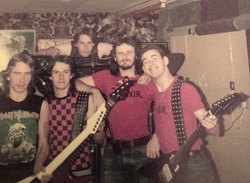
Q: It must have been tough back then in the NWOBHM days with the “movement” at its peak and bands appearing (and sometimes disappearing) overnight. What was it like in the mid-1980s trying to get ahead with so much competition around.
PD: I think it was a lot easier then than now. There was still a thriving scene, with lots of live venues to play and hangouts such as Shades record store and The Royal Standard venue in London. Bands like us would meet on a Saturday afternoon at Shades. Along with buying great debut albums by bands such as Mercyful Fate, Cloven Hoof, Chastain, Crimson Glory and Queensryche there, we would chat with the guys from Chariot and Driveshaft, and that would lead to a camaraderie between us. It was the same at The Royal Standard, where you would see guys from Tokyo Blade etc. there for either the live gigs on Friday night or Neal Kay’s rock disco on Saturday nights. This would lead to organising gigs together or generally sharing information and helping each other out. Information such as good places to play etc. Maybe there were one or two bands that looked upon us and others as competition, but on the whole, most of us were friendly towards each other and tried to help each other out.
I feel it is much harder to play gigs now, as the venues with a regular rock crowd have died out. Back in the 80’s, there would be a circuit of venues that had Friday or Saturday rock nights, and even if you weren’t well-known, you would have a crowd to see you, and as a result, you would get paid. These days we mainly have to play multi-band festival events to play to a crowd.
Q: The debut album, The Son of Odin, is these days considered something of a classic. How did it go down at the time and push Elixir’s career onwards.
PD: It took it’s time to grow, mainly through word of mouth I suppose.
We recorded the album in January 1986 and took the tapes around the labels to try to get a record deal. Some labels had been showing interest off the back of our live shows in 1985, but when we played them the album, they were telling us that we sounded “too British”!! Bon Jovi was just becoming big with ‘Slippery When Wet’ and there seemed to be a flood of American bands becoming popular with poppy sing-along choruses, so our album wasn’t the kind of thing labels were looking for in 1986. In the end, we decided to put it out on our own label, pressed 2000 vinyl copies and released it in July.
I remember that it got a very good review in Kerrang! Shades, the independent Rock record store, stocked the record and sold boxes of it, which helped to spread our name. This was important, because many Rock fans from abroad would come to London and make a visit to Shades. I remember we received a letter from Brazil saying how much they liked our album, and I couldn’t believe that it had reached that far!! Mostly we sold the album at gigs and through mail order.
It didn’t suddenly “take off” and catapult us to stardom, but it maintained steady sales until we sold all of that initial pressing. It still sells steadily today.
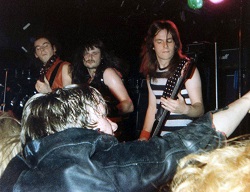
Q: Did the Friday Rock Show session help too (listening to “TV on the Radio” on a Friday night was a requirement for any rock music fan, I discovered many a fine band thanks to that program)
PD: It certainly didn’t do us any harm, but there was no sudden change to our circumstances. We continued to play venues all around the UK through 1986 and into 1987. As you say, “TV on the radio” was an institution to rock fans, and I used to listen to it religiously as a teenager in Luton, where there wasn’t much in the way of entertainment for rock fans.
It was a fantastic experience to meet and work with Tony Wilson. We recorded four songs at the BBC Maida Vale studios on Friday 7th February 1986 and I returned to mix the tracks with Tony the following week.
Q: A second album followed with the late Clive Burr on drums. Clive was a heck of a drummer. Much missed. Did Lethal Potion build on the success of The Son of Odin.
PD: Clive was indeed a brilliant drummer and a great guy who was fun to be around. However, no drummer, however good they are, has the same feel that Nigel has. It’s strange, but Nigel is such an important part of our sound in the way he reacts to the riffs and we write the songs around his drumming. He can be unorthodox in his playing, but vital to the sound, and Elixir just does not sound right without him.
Regretfully, both Kev and Nigel left the band in February 1987, when we had the studio lined up ready to record our second album. We got Mark White in on bass and Clive Burr on drums, and to me now, it just doesn’t sound like Elixir should sound.
We had taken on board the label comments about sounding too British, and tried writing a few more commercial “American” style songs, such as ‘She’s Got It’, ‘Louise’ and ‘All Together Again’. We figured that we needed a record deal, and that was the way to get one. In hindsight, that was a mistake, and the only time that we compromised our music. Since then, we have made the records that we wanted to make.
Overall, I really dislike the second album. There are a couple of good songs on there that we wrote when the Dobbs brothers were still with us, such as ‘Sovereign Remedy’ and ‘Llagaeran’, but they sound much better with the Dobbs brothers playing them.
The production was also disappointing. The producer on that album, Roland Harris, wouldn’t let Norm and I get our distorted guitar sound, telling us to clean it up so that the leads could come through clearer. I think the songs really suffered because of that, as they lost the power and energy.
I look on the second album as a big missed opportunity. If we had made the second album with our Denton/Dobbs/Dobbs/ Gordon/Taylor line-up, with decent production, I think we could have progressed. With the change of personnel, and change of direction in the songs and sound, I think the second album really let us down, and I don’t think it helped us progress at all.
Q: Elixir have remained active one way or another to the present day releasing albums, playing festivals. The interest in and relevance of NWOBHM remains strong after forty years or so with many bands (including Elixir) from back them putting out strong albums. Does that help motivate you to keep going too.
PD: I love writing songs and recording, that’s what motivates me. If the band wasn’t active, I would still be doing that, even if there was no chance that the songs would be released and heard. In the years when Elixir wasn’t active, I wrote and recorded songs with local musicians, and even recorded a couple of songs with my wife! Fortunately for me though, at the moment, I have a great band in Elixir to record, perform and collaborate on my songs.
Q: The latest album – Voyage of the Eagle – sees four of the original Elixir members back together again. How did that come about and how has the album been received – successfully I hope.
PD: I was at home a couple of years ago and started writing some songs. Looking for a theme or subject matter, I thought about the song ‘Dead Man’s Gold’ from the first Elixir album, and decided to write some songs expanding on that story. I had four songs for an E.P. and felt that they should be recorded by Elixir, and so I contacted the guys. Although we hadn’t been active for a while, we were still friends, kept in touch and had seen each other now and again.
Norm Gordon (guitar) and Nigel Dobbs (drums) agreed right away. Kev Dobbs (bass) had been the one to call it a day back in 2012, and still didn’t want to take part. He felt that we had finished on a high note with the ‘All Hallows Eve’ album, and wanted to leave it there. Paul Taylor (vocals) said that if we were going to record an E.P., then we might as well make it an album! So we decided to make an album, but try as we might, we couldn’t get Kev to agree to be a part of it, even though we really pestered him! I recorded guide bass myself in the initial stages of recording, but with Kev’s blessing (he probably just wanted to get us off his back!!) he said that we should get another bass player in. We found a young guy called Luke Fabian to record the album. Luke plays a range of different styles, and has his own band called Pupil Slicer, that plays very fast extreme Metal. Luke said that he grew up on the NWOBHM stuff and loved our songs, so he came in and did a great job on the album.
Reviews have been mostly positive. We have our Classic Rock and NWOBHM style, and made a record in the style that Elixir fans know and love. There have been a couple of reviews that say our record sounds like it came straight out of 1985, but that is exactly what we were trying to do!! We didn’t attempt to go “modern” or put in those growly vocals that bands do these days, we just made a classic, melodic and epic sounding record.
The reviewers who got the point and were aware of what we do, said that it is the best record we have made since ‘The Son Of Odin’ and I think they are probably right! The band is tight and played really well, and Paul is singing better than ever. One reviewer said that it is rare for a band to record two classic albums almost 40 years apart.
The main thing is our loyal fans have told us that it is exactly the kind of Elixir record that they would have wanted in 2020. A couple of people have commented that they can’t stop playing it, which is a really fantastic complement.
At the end of the day, we have to make the best record that we can, and I must say that I am extremely happy with it and with the great way that the label have presented it. It has a fantastic 24 page illustrated lyric booklet with the CD, and the LP is on a lovely blue vinyl in a gatefold sleeve. Both the CD and vinyl LP are available from the Plastic Head Megastore: https://www.plastichead.com/catalogue.aspx?ex=backlist&target=ELIXIR
Once you have made the best record that you feel you can, you just have to hope that other people will like it too. We cannot afford massive promotional campaigns, and so we mostly rely on word of mouth. Like ‘The Son Of Odin’, I feel that this record will slowly and steadily keep on selling and selling as people get to know about it.
Q: Do you have any particular anecdotes from the “old days” you’d like to mention.
PD: There’s a bit of an amusing story from that B.B.C. session actually. We had recorded the title track from the album, ‘Son Of Odin’ and I wanted a keyboard for effect on the song. When we had recorded the album at The Enid’s studio, The Lodge, their keyboard player, Robert John Godfrey, had kindly allowed us to use his keyboards. This gave a dramatic effect to ‘Son Of Odin’ where we had used a Moog synth for the wind intro, and a Yamaha DX7 for the string effects in the chorus and the low sustaining note at the end of the chorus. However, there were no keyboards available at the B.B.C., but they did have a grand piano, and so I asked Tony Wilson if I could use it. He said that we could, but he would need to get an engineer in the studio to mic it up. He made a phone call and we waited for the engineer to arrive. After deciding which microphone we needed, the engineer headed off to the store cupboard, sourced the mic and spent some time setting it up under the raised lid of the piano. After a sound check, Tony said that they were ready for me to record my piano part. They ran the tape and I hit that one sustaining note. As the note died out, Tony’s voice came through my headphones, “is that it?!” “Yep, lovely!” I replied. A couple of minutes later, the note had been applied to all choruses, and the engineer was summoned to come and take the microphone away!
I wouldn’t say that we are a demanding band, as we are all down-to-earth guys, but when you are going out on The Friday Rock Show, you want to present your music in the best way that you can!
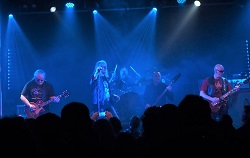 Q: What does the future hold for Elixir – any plans.
Q: What does the future hold for Elixir – any plans.
PD: Making the new album was the first priority for us. We tried to keep the fact that we were back together quiet while we were getting the album together, but coincidentally, just as we started, I was contacted by Andy Holloway from Burr Fest. Burr Fest had ran for three years, and Andy had asked his audiences what bands they would like to see on the bill in the future, and apparently our name came up. Andy told me that he knew we weren’t together, but would we consider re-forming to play a one-off show to raise money for MS sufferers in memory of Clive Burr. I replied that actually we had started recording together again, but doubted whether Kev would agree to do it. To our surprise, Kev said that it was for a good cause and that it would be good for him to play one last farewell show to the fans in London, where it all began for us. On the night, Nigel counted us in and the power and energy that swept across the stage was like a force of nature! We were back and sounding better than ever!
As word got out that we were playing Burr Fest, we started getting other offers in to play. We should have played the great German festival Keep It True in April, along with a couple of Belgian club dates either side of the festival, but unfortunately, because of the Corona Virus outbreak, those dates are having to be re-scheduled.
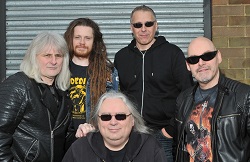
We have also been asked to play the Into Battle Festival in Athens in December, and UKs Bro Fest next February. Hopefully restrictions will have been lifted by then and we can play them.
Unfortunately, Kev won’t be playing those shows with us, so we will be using another bass player.
I cannot see us gigging very often, as the live venues just aren’t there like they were in the 80s. In this modern world, I see us having to have more of an online presence. We have our website: www.elixirnwobhm.com our Facebook page: www.facebook.com/elixirnwobhm and our YouTube channel: ElixirNWOBHM and we are thinking of ideas, via those outlets, to entertain our fans both here in the UK and overseas. We are hoping to do something in December as a special Christmas treat to the fans, but of course, we will be relying on these lockdown restrictions to be lifted.
Q: You are also involved with Midnight Messiah – how’s it going with them.
PD: Midnight Messiah was a band that Paul and I put together when Kev called it a day with Elixir in 2012. As we had written a bunch of songs, Paul and I decided to carry on with another band very much in the same style as Elixir. We made two albums with them, and played at Hard Rock Hell and a few other places such as Heavy Metal Maniacs in Holland. When we played together, the band sounded great, but there wasn’t that same tight-knit band camaraderie that we had with Elixir.
The lead guitarist, Dave Strange, plays with a bunch of other bands, including Tytan, a band you may know on this site, and Darren Lee, the drummer, also played with a bunch of other bands such as Weapon UK, and he was in the middle of a world tour playing arenas with The Bay City Rollers when the Corona Virus thing started. He played venues like Wembley Arena, Manchester Arena etc. and was living the dream. He loves his drumming, so good luck to him!
Alex, the bass player is performing his own songs now, so I would say that Midnight Messiah is finished. It was good while it lasted, and we recorded two great albums, but everyone has now moved on. For Paul and I, Elixir is our main focus, and the band that we will be writing material for in the future.
Thanks again to Phil for taking the time to undertake the interview. Most appreicated. I’ve ordered Voyage of the Eagle via Elixir’s web site (link above) and will review here after it arrives. And here is my review of Voyage of the Eagle – read it here.